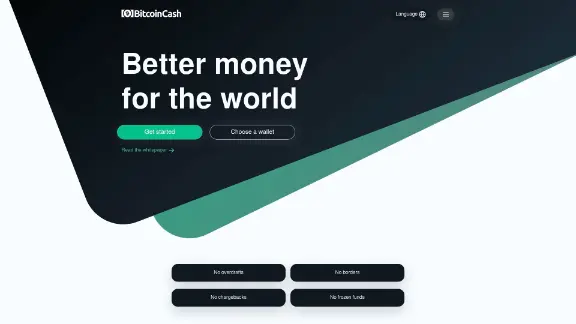Bitcoin Cash (BCH)
Bitcoin Cash (BCH) is a proof-of-work blockchain network and cryptocurrency that emerged as a hard fork from Bitcoin in 2017. It is designed to enable faster and cost-effective transactions, offering low fees and quick confirmation times. As a peer-to-peer electronic cash system, it removes the need for regulatory authorities and third parties in financial transactions. A community of developers maintains Bitcoin Cash, viewing it as a payment system alternative to Bitcoin. It operates on the Bitcoin Cash Node, which serves as the ecosystem for conducting transactions in Bitcoin Cash.
History of Bitcoin Cash

| Ticker | BCH |
| Category | Smart Contract Platform |
| Website | https://bch.info/ |
| Telegram | bchchannel |
| https://www.reddit.com/r/btc |
Early discussions and tensions
The idea of increasing Bitcoin's block size was discussed as early as 2010. However, these discussions gained prominence in 2017 due to rising transaction fees and differing opinions on scaling Bitcoin. Supporters of larger blocks argued that increasing the block limit was necessary to enhance transaction capacity and fulfill the vision of a peer-to-peer electronic currency.
Creation and evolution
Bitcoin Cash advocates aimed to achieve high transaction throughput without second layers, while maintaining low transaction fees. They launched Bitcoin Cash on August 1, 2017, as a hard fork of Bitcoin with an initial block limit of 8MB, which was later increased to 32MB. This decision led to the formation of Bitcoin SV in 2018, following another hard fork.
2018 split to create Bitcoin SV
On November 15, 2018, a hard fork resulted in the split between Bitcoin Cash and Bitcoin SV. This split was driven by differing views on block size and was supported by various prominent figures and organizations within the cryptocurrency community.
Technology of Bitcoin Cash
Blockchain and consensus mechanism
Bitcoin Cash operates on a distributed, time-stamped ledger of unspent transaction output transfers stored in an append-only chain of 32MB data blocks. A network of mining and economic nodes maintains this blockchain. Bitcoin Cash utilizes a proof-of-work consensus mechanism, allowing larger blocks than Bitcoin, enabling more transactions per second.
Tokenomics of Bitcoin Cash
Supply and distribution
Bitcoin Cash has a maximum supply of 21 million coins, created through mining. The distribution occurred through a Bitcoin hard fork, with existing Bitcoin private key holders receiving the new BCH coins.
Governance of Bitcoin Cash
Development and upgrades
Bitcoin Cash's development is open-source, with proposals submitted and debated by the community. Protocol changes are ratified on-chain with the majority network adoption. The network undergoes planned upgrades bi-annually, using hash power signaling to indicate support for network upgrades.
Utility of Bitcoin Cash
Long-term store of value
Bitcoin Cash is capped at 21 million coins, ensuring a long-term store of value. The issuance rate decreases over time, making it a disinflationary asset. Halving events reduce the block reward approximately every four years.
Medium of exchange
Bitcoin Cash facilitates peer-to-peer payments with low transaction fees, making it suitable for remittances, cross-border trade, and daily transactions. Its efficiency also supports micro-transactions, such as tipping content creators.
Economic freedom
Bitcoin Cash provides an alternative form of money, supporting economic freedom with strong protection against monetary confiscation, censorship, and inflation.
Bitcoin Cash upgrade 2023
Overview of the 2023 upgrade
The May 2023 upgrade for Bitcoin Cash is active on the test network, with developers encouraged to migrate to Chipnet as the primary test network. Chipnet deploys network upgrades in November, offering developers time to adapt before the main network activation.
CHIP 2021-01 restrict transaction version
This proposal aims to restrict the transaction version field to available versions, paving the way for future transaction version upgrades that optimize network bandwidth and storage.
CHIP 2021-01 minimum transaction size
This proposal suggests lowering the minimum transaction size to enable more efficient transactions, without compromising security.
CHIP 2022-02 CashTokens
This proposal introduces fungible and non-fungible tokens, allowing decentralized applications on Bitcoin Cash with enhanced efficiency.
CHIP 2022-05 P2SH32
This proposal enables 32-byte Pay-to-Script-Hash outputs, addressing a longstanding vulnerability in certain contract types.
